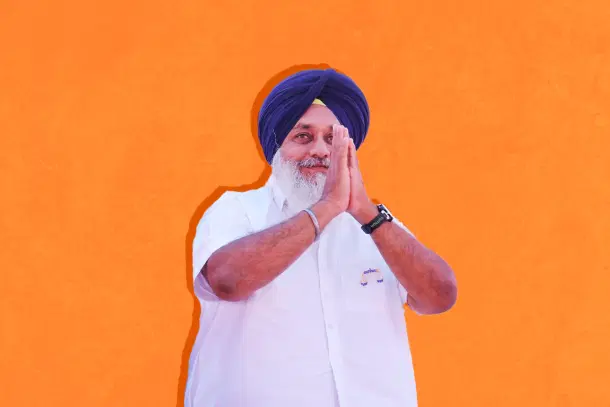Politics
Punjab: How An Internal Crisis Is Unfolding In Akali Dal
Aryaman Sharma
Jun 27, 2024, 02:15 PM | Updated Aug 05, 2024, 05:11 PM IST
Save & read from anywhere!
Bookmark stories for easy access on any device or the Swarajya app.


The Shiromani Akali Dal (SAD) is grappling with a significant internal crisis as senior party leaders publicly demand Sukhbir Singh Badal's resignation as president.
This rebellion, long simmering beneath the surface, erupted during a crucial meeting in Chandigarh, where district presidents and 'halqa in-charges' gathered under Badal's leadership.
On the other hand, several senior leaders boycotted this meeting, convening in Jalandhar to launch the "Akali Dal Bachao Lehar" movement, symbolising their effort to save the party from what they perceive as Badal and family’s mismanagement.
Rising Discontent Among Leaders
The rebellion stems from the party's dismal performance over recent years.
Under Badal's leadership, the SAD's influence has waned considerably. In the 2022 Vidhan Sabha elections after breaking up from Bharatiya Janata Party (BJP), the party secured only three out of 117 seats with vote share going down to 18.37 per cent from 25.2 per cent in 2017 and 34.7 per cent votes in 2012 assembly elections.

The 2024 Lok Sabha elections were equally disappointing, with the SAD winning just one out of 13 seats, held by Harsimrat Kaur Badal from Bathinda, that too after putting all party machinery on this one seat.
This decline is highlighted by a significant drop in vote share to 13.42 per cent, in contrast to the BJP's rise to 18.56 per cent vote share alone. All the while this was BJP’s second election they fought alone after getting 6.6 per cent votes in 2022 assembly elections.
Adding to the woes, independent candidates won in the Khadoor Sahib and Faridkot (SC) constituencies, further underscoring the party's dwindling influence taking over the traditional Akali political space.
Prominent rebel leaders, including ex-MP Prem Singh Chandumajra, Sikander Singh Maluka, Bibi Jagir Kaur, Parminder Singh Dhindsa and Charanjit Singh Brar argue that the SAD needs new leadership to navigate out of its current crisis. They believe a leader with both political acumen and religious understanding is essential for the party's revival.
Sukhbir Badal, however, has dismissed these demands, labelling the rebellion as an externally orchestrated conspiracy, particularly by the BJP, aimed at weakening the SAD from within.
Sukhbir Badal’s Firm Stand On Hold In The Party
In response to the rebellion, Sukhbir Badal convened a meeting of SAD district presidents at the party's headquarters in Chandigarh. Here, he emphasised that the party must resist becoming a tool for anti-Panthic designs and declared that the SAD was ready to endure tough times for the sake of the Panth and Punjab.
Sukhbir Badal stressed that those prioritising personal gain over the dignity of the Panth and Punjab were free to leave, reaffirming the party's unwavering commitment to Panthic principles.
Despite the rebellion, Sukhbir Badal claims substantial support within the party, noting that 96 out of 105 halqa in-charges have expressed their full faith in his leadership.
The district presidents criticised alleged government conspiracies to undermine the Panth and Punjab, praising Badal's decision to avoid alliances with the BJP.
It is interesting knowing that were speculations to the effect that Sukhbir Badal was continuously and actively trying for a pre-poll alliance with BJP before 2024 Lok Sabha elections, talking on a much new radical seat sharing of seven for BJP and six seats for Akalis as he knew that BJP was getting stronger and AAP weaker meaning, Congress will win most seats leaving him dry.
Role Of SGPC President Now
In this crisis, the role of SGPC president Advocate Harjinder Singh Dhami becomes pivotal.
Traditionally, the SGPC president, elected annually by the SGPC's full house, is supposed to be independent of SAD's internal politics.
However, since the 2011 SGPC general body elections, the house has been dominated by SAD (Badal) loyalists, making the SGPC president effectively a nominee of the Badal family. With new voter registrations for the upcoming SGPC elections closing on 31 July, Dhami's stance will be crucial amidst the widespread rebellion.
If Dhami distances himself from Sukhbir Badal, the extensive infrastructure of the SGPC could become inaccessible to Sukhbir's faction, exacerbating his challenges and potentially posing a greater threat than the rebellion itself.
A Key Player In The Crisis
Bikram Singh Majithia, currently the general secretary of SAD, plays a critical role in this unfolding drama. Known for his rapid rise and significant influence within the party, Majithia's absence from the meeting chaired by Sukhbir Badal on 25 June highlights the underlying tensions.
Despite his legal challenges, including a criminal case under the NDPS Act, Majithia remains a key figure, particularly after the expulsion of Adesh Partap Singh Kairon in May 2024. This power shift towards Majithia and his sister, Harsimrat Kaur Badal, underscores his pivotal role in the party.
Rumours of a rift between Sukhbir Badal and Bikram Majithia, though officially denied, have gained traction. Majithia's absence from key meetings and events, including the "Punjab Bachao Yatra" and the recent halqa in-charge meeting, accentuates this tension.
Known for his political savviness and effective organisational skills, Majithia's future actions will be crucial in determining the trajectory of Sukhbir Badal’s leadership. His influence, bolstered by his family's electoral successes, ensures he will play a significant role — positively or negatively — in shaping the party's future amidst its current challenges.
SAD At The Crossroads
As the SAD navigates this internal turmoil, it stands at a critical juncture. Simply labelling the rebels as agents of the BJP will not suffice.
Sukhbir Badal must fundamentally change his leadership style and reconnect with the diverse populace of Punjab. This includes not only the traditional rural Jat Sikh vote but also reaching out to Scheduled Castes, Hindus, and women, even if it takes a smaller role and alliance with BJP.
As the electoral results have shown, SAD could win only one seat but lost all other 12, coming fourth behind all three other parties on 11 seats and fifth on the seat of Sangrur.
Efforts to placate rebel leaders and secure the support of SGPC president Dhami and Bikram Majithia are imperative. Failure to do so will jeopardise both his leadership and the future of the Shiromani Akali Dal, which remains a waning but vital political entity in Punjab.
Despite its recent electoral setbacks and the rise of independent Panthic candidates, the SAD remains a fundamentally regional party in Punjab, deeply rooted in the historic struggle of the Sikhs.
However, its future trajectory remains uncertain, especially after its formal break with the BJP. The party's recent outreach efforts to regional parties in other states, coupled with the limited appeal of the BJP in Punjab’s rural areas and the AAP's waning influence, provide a glimmer of hope.
The Congress, having won seven out of 13 seats, remains a significant force with its own worries now.
While a rapprochement with the BJP before the 2027 Vidhan Sabha elections seems unlikely with the stance of BJP totally against any coalitions, and sustained fighting alone while getting internal problems solved, the fluid nature of politics means anything is possible.
Even the staunchest critics of SAD do not wish to see it dissolve, given its deep pro-Punjab credentials. For SAD to reinvent itself as an authentic regional party of Punjab, it must reflect the aspirations of all communities in the state, not just Sikhs or farmers or Jats. This involves moving away from functioning like a family-run enterprise and embracing a broader, more inclusive approach.
The decisions the SAD leadership makes today will determine whether it ascends, or fades into political oblivion. Delaying these crucial changes will only allow other forces to occupy the political space, potentially threatening the peace, prosperity, and progress of Punjab.





